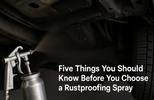
Five things you should know before you choose a rustproofing spray
, by Mia Beewen, 2 min reading time

, by Mia Beewen, 2 min reading time
If so, avoid wax, varnish, or rubber-based products. These trap moisture under the surface, allowing oxidation to continue.
Oil-based rust inhibitors, on the other hand, penetrate through the rust to the intact metal, displacing moisture and oxygen and thus stopping oxidation.
Yes – if you choose a product that has been specifically designed to creep and spread.
This is particularly important in body cavities, where rust often starts. These areas are often inadequately protected and retain moisture.
Well-designed products minimize dripping. Only use rust protection sprays that have been specifically manufactured for this purpose in order to benefit from intensive research and development.
Oil-based sprays remain permanently soft, offer a self-healing surface, and do not chip or crack.
Conventional (hard) underbody protection products should cure within a week.
NHOU® Back N Black, an oil-based rust protection spray, improves the appearance of rusty surfaces and offers the same protection as the clear NH oil variant.

Despite all the advances, cars and trucks still rust.
Trust NH Oil Undercoating® if you want to protect your vehicle effectively.
Rust protection spray is more important today than ever before, as brine (salt solution) is increasingly being used on roads.
Brine is effective against ice, but extremely corrosive to the underbody of vehicles – it significantly accelerates rust formation.
According to a 2017 report by the AAA, consumers spend over $3 billion annually on repairs caused by corrosive de-icing salts.

Early protection of your vehicle not only increases its value, but also protects against structural damage and improves driving safety.
NHOU's oil-based rust protection is: